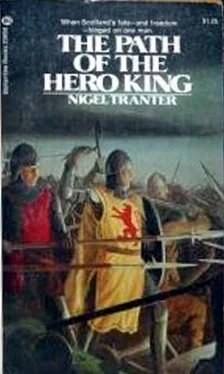At Turnberry, Bruce sent out couriers in all directions, to his so scattered captains. All present operations were to be suspended immediately. Most groups were to rejoin him with all speed. There was to be no large-scale confrontation with the main English army.
Harassing of flanks, rear and lines of support might be engaged in, but all the major effort was to be concentrated on laying waste the land in front of the advancing invaders, denying them supplies and shelter. Any stand to be made would be made at or near Stirling;
but that was for the future.
Scouting parties were, of course, sent off south-eastwards to ascertain the enemy progress. Because of the delay with the news, they could be expected by now to be well into Scotland. From Berwick, if they were in fact making for Glasgow-as was reasonable, so that they could relieve besieged Bothwell and Kirkintilloch also-they would almost certainly move diagonally across country by Roxburgh, following the Tweed up through Melrose and the Forest to Peebles, and then over the mouth of Tweedsmuir and the high spine of Southern Scotland, to the upper Clyde valley. There was not much that could be done to devastate the land before and through the Ettrick Forest-where there was little to devastate indeed-so that Bruces main attention must be to the grim, heartrending business of destruction of the fair Clyde valley and its surroundings-Douglas country. He had done it before, more than once, and he could do it again-but it went even more sorely against the grain, this harsh and wholesale eviction and impoverishment of his own people. But it was the only way that he could eventually halt the mighty invader, since he refused utterly to risk all in a great battle which was what the English wanted, with their preponderant power in numbers, heavy cavalry and hosts of archers. But a huge army of scores of thousands had to live largely on the country it passed through, and inevitably eventually ground to a halt if it could not gain food for its men and, above all, forage for its horses.
Keith was sent off, therefore, with a small contingent, to do what he could by way of delaying tactics in the Forest area, while Bruce headed for upper Clydesdale, calling for men from all quarters to aid in the terrible work. Once it was confirmed that King Edward was to come this way, across the watershed, they would start. And he called a council-of-war at Cadzow for five days hence.
Joined by Douglas, the King was at Lanark with just over a thousand men, when a messenger from Keith confirmed that the English were coming indeed. Roxburgh, Melrose, Selkirk and Peebles were ablaze, and, on the fringes at least, the Forest was beginning to hang with dead men.
So the order was reluctantly given, and the great burning of fertile Clydesdale began, and Douglasdale with it, James Douglas acceding. The people were dispossessed and herded into the hills;
all houses great and small, all barns, mills and other buildings, even churches, unroofed; all grain, hay and standing crops burned-and where the latter would not burn, trampled and flattened and wasted methodically; all bridges were demolished and fords made impassable; river banks and mill-lades were breached, pastures flooded, wells fouled with the car cases of all stock which could not be herded away. Inexorable, Bruce drove his manmade desert north by west, on a vast ten-mile-wide front. It took him back over the years to 1299, when he had first ravaged this same country, though in the other direction. And still they were fighting for Scotlands very existence. Eleven years! How long, oh Lord-how long?
Those days the King was bad company indeed, a savagely-fierce unapproachable man, black-browed, bleak-eyed, as he burned the realm he had dedicated his life to saving, made homeless the people he had vowed to protect. Even Gilbert Hay and James Douglas kept their distance, warily.
Lanark itself was soon overtaken into the pattern of desolation and left a blazing pyre. The council-of-war was put forward two days and called now for Rutherglen.
Edward Bruce arrived, the next day, from Galloway with 400 cavalry and the word that 1,500 foot was coming on, by forced marches, behind him. He brought more bad news. Another English force had crossed Solway from Carlisle, under the Earl of Richmond, and was ravaging and slaying its way up their own Annandale and Randolphs Nithsdale. As angry a man as his brother, if in a different, hotter fashion, he asked, demanded, permission to take the main force and give battle in the passes of Moffat and Dalveen and Enterkin -and was curtly refused.
Lennox was the last to arrive, from besieging Kirkintilloch -for Angus Og and most of the other Highlanders were meantime back in their own territories. The Earl was sadly depressed.
Were they back where they had started, after all the years of bloodshed and sorrow? For once he got only short shrift from his friend.
The council at Rutherglen was a sorry one, difficult, rancorous, with
disillusion heavy upon all. Edward led a strong group in a mood of hot
defiance, urging attack, attack. If they had to go down, let them go
down fighting, like men-not running, savaging their own people.Campbell urged a retiral forthwith to Stirling, there to stand to the end, at the narrow waist of Scotland, abandoning all the South as hopeless but making a stronghold of the North. Reluctantly Lennox, Boyd and Douglas agreed. But Bruce was sternly adamant that they continue to drive their slow way north-westwards. They could by no means defeat the Plantagenet -but they could starve and sicken him. And this Edward would sicken more quickly than his sire. Abandon the South to him and he would install his armies in Glasgow and Edinburgh, if necessary for the winter, supply them by sea, and so be in a state to marshal his fullest force against the crossing at Stirling when he was ready. That way lay ultimate disaster-whereas his brothers way was to make disaster immediate.
Timeously, during the council, another courier arrived from Lamberton, forwarded by Keith from Biggar. It was to report that King Edward was now aiming, after relieving Bothwell, not at Glasgow but towards the sea-or at least, the mouth of the Clyde, in the Inverkip-Renfrew area. John MacDougall of Lorn had been sent to Dublin to collect and captain a fleet of shipping and Irish galleys from the Anglo-Irish there, with their mercenaries, and to sail up the Clyde with them. On the Renfrew coast he would make contact with the King, and ferry over the main English force to Dumbarton and the Lennox, so that it could then turn east, by passing Stirling, and make direct for Perth and Dundee, avoiding the natural bastion of the Forth and Clyde and intervening wilderness of the Flanders Moss. Thereafter, John of Lorn would take his fleet northwest into the Hebrides, to win back his fathers Argyll and to deal with the Lord of the Isles.
Much shaken, the council listened to these tidings-which of course
made nonsense of much that had gone before. But it only confirmed
Bruce in his determination to wear down the English before ever they
reached the sea. The devastation policy would go on. In addition,
wrecking parties would make for all the Clyde ports and havens, from
Carrick northwards, to destroy and make unusable all harbour
facilities, so that, on the west coast at least, hungry angry, soiled,
frustrated and almost mutinous, the King had lost all taste for so inglorious an adventure-and Piers Gaveston with him. John of Lorn had not yet put in an appearance; the weather was bad, and there was famine in the land. Moreover Bruce was apparently prepared to burn all Glasgow and the West before him indefinitely. In petulant rage, he ordered a retreat by Linlithgow and Lothian, to Berwick, where they would winter. He did not trouble to try to inform John MacDougall.
Читать дальше












